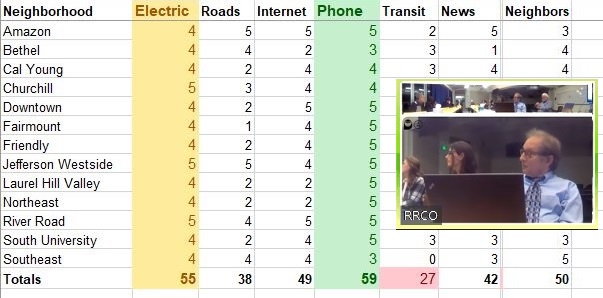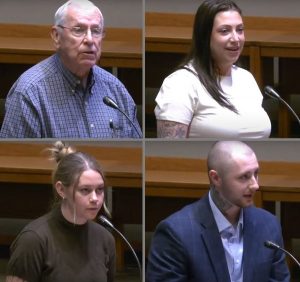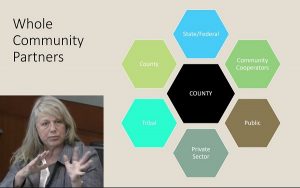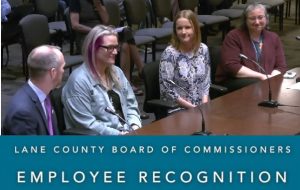Neighborhoods use STAR voting to rate community lifelines during the ice storm
8 min read
The Neighborhood Leaders Council (NLC) rated local community lifelines during the ice storm. The exercise also demonstrated STAR voting, which uses a zero-to-five rating system to help capture voter preferences. On Jan. 23, local STAR voting advocate Sara Wolk.
Sara Wolk: I’m Sara Wolk. I’m here representing the STAR voting ballot initiative and Equal Vote Coalition nonprofit. So for this coming election May 21, (2024), STAR Voting has made the ballot. Eugene voters will have the chance to vote yes and upgrade our elections to the five-star voting method instead of yes-no binary.
[00:00:39] Randy Prince: I am Randy Prince, co-chair of Amazon Neighbors, and in the second month of my service as an NLC co-chair. And we thought we’d do a little poll on how the storm affected you.
[00:00:54] We’re not the only ones interested in this. I noticed the Whiteaker Community Council has an online poll for those neighbors about how well-prepared they were. To help us, we’re going to poll you and we’re going to do some fast go-arounds in this scoring system to see about your lifelines.
[00:01:13] Lifelines are a concept in disaster preparedness that help authorities evaluate how well things work, and also neighbors, for what they need to be prepared for. Examples of lifelines are electric power, roads, bridges, services. We’re not going to test you on all the things that are considered lifelines, but we picked a convenient number and I’m going to hand out a paper ballot.
[00:01:41] However, I’m not going to have you turn it in. We’re going to do a roll call, but to help you we’re going to read the full question. So we’re going to pass this around, a paper copy of the ballot, which you’ll notice has those fun little things, the bubbles that you fill in. It’s a zero-to-five scoring system, and we’re asking how well the provider or the system worked for you? Did they do a great job under the circumstances of coping with the demands of the ice storm, (which was not a very normal thing around here)?
[00:02:16] And I’m asking the neighborhood reps to be the voters, and we’re going to poll by neighborhood. After we’ve read the questions and you’ve completed your ballot, we’re going to take a voice vote and we have a recorder here and we have a backup recorder to tally the results and give you the result of our polling system.
[00:02:36] Before I start with the questions that we’re asking you to answer on a scale of zero through five, I want to ask everybody to please try to score for your neighborhood. Even if you don’t know everything about what happened during the ice storm, try to please complete your ballot.
[00:02:56] And if you have limited information, do the best you can. If you really don’t know anything (you probably should have known), you could put a zero in there for whatever one of these lifeline providers didn’t tell you about, but try to complete your ballot fully. That would help us, particularly in this adaptation of the scoring system we’re using tonight, which you’ll hear a little bit more about tonight.
[00:03:18] This is a fun exercise. It will provide us with some usefulness and if it’s specific to your neighborhood, that’s especially helpful to know. Some of the responses to the ice storm do relate to characteristics of the neighborhood. If your neighborhood’s hilly, the roads are not going to do as well. But they did the best they can or they did the worst they could. And some of it we just want to know how it might be different providers.
[00:03:42] Somebody’s got a question online. Lisa does.
[00:03:46] Lisa Plaxco (Friendly Area Neighbors): Hi there. It’s just my first time participating and I just wanted to know that you will be able to tie my response to the neighborhood that I represent, which is the Friendly Area (Neighbors).
[00:03:57] Randy Prince: We will. (Thank you.) We will call the name of the neighborhood and this is what you’re marking and for the people online, you don’t have to have a copy of this ballot in front of you. But if you write down the number of your score when we do our fast go-around—’cause I think that’ll be informative too, to hear what other neighborhoods say—please answer with the number for the question.
[00:04:18] John Q: Randy requested ratings for the following eight lifelines: electricity, roads, internet, mobile phones, on-demand transit, news, emergency alerts, and one more.
[00:04:30] Randy Prince: The last question, this one’s called ‘Neighbors Helping Neighbors.’ So when emergency becomes disaster, no government or private organization can meet the public’s needs. Neighbors must step up and help each other. In most cases, the help is ad hoc, a spontaneous response to the system. Sometimes people have organized in advance, such as forming Map Your Neighborhood groups or amateur radio networks to help out in disaster. So please score the neighbors in your neighborhood at how well their voluntary actions helped meet the special needs that arose during this storm, to the best of your knowledge.
[00:05:09] John Q: Randy asked each neighborhood to list the number of stars awarded to each lifeline. A dozen other neighborhoods shared scores, the same way he shared his scores for the Amazon Neighbors:
[00:05:20] Randy Prince: On the question about electricity, what’s your score? Amazon, I’m giving a four. Okay, now roads and I’m giving them a five in Amazon. Okay, now let’s see about how your internet and cable worked out for you. Amazon, I’m giving it a five. Okay, we’re almost half done here. Cellphone service? Amazon, five. Transit: How’d the cab, how’d the taxis, Lyft, Uber, do? Amazon, two. On to the next question. Local news service keeping you informed: Amazon, five. The official alert system. (Most of you may be participating in that, but if not, anything you heard from anybody about how well it informed you? This is actually the Lane County Alert System and our committee has talked with the previous director about how well it’s going.) And Amazon, one.
[00:06:22] Yeah. Okay. Finally, as best as you can tell, how the neighbors stepped in to help each other for the things that nobody else could really help with: Amazon, I’m giving us a three.
[00:06:34] Okay. Well, that is our voice-vote version of this polling / ‘best of.’
[00:06:41] John Q: The results were then scored in two rounds using STAR voting.
[00:06:46] Sara Wolk: So with STAR voting, you score your candidate zero to five stars, and then the system finds the two highest-scoring candidates overall. Those are your two finalists. And then you don’t have to vote again. Your ballot already shows which of those finalists you preferred. So your vote will ultimately go to the finalist you prefer, and the candidate with the most votes wins. So that’ll help us find essentially a winner as, like, best local utility for (Yeah, yeah) their storm response. (Yeah.)
[00:07:14] So for our results: We had for electricity, we had a total of 55 points; for roads we had 38; for internet and cable TV, we had 49; cell service was 59, our highest. On-demand transit was 27; local news was 42; official alerts was 25, and neighbor-helpers was 50.
[00:07:40] So the two highest-scoring candidates were electricity with 55 points and cell service with 59. So those are our two finalists that advanced to an automatic runoff.
[00:07:52] Then we went through and looked at each of your votes and marked whether you had scored cell (phones) higher or scored EWEB (electricity) higher. So that ends up being one vote for the finalist you prefer, or a vote of no preference or equal preference between those two.
[00:08:07] So we did have some people who gave five stars to both, or four stars to both. That’s counted as neutral, essentially.
[00:08:15] John Q: To review how the Amazon neighborhood scored the two finalists:
[00:08:19] Randy Prince: On the question about electricity, Amazon, I’m giving a four… Cellphone service? Amazon, five.
[00:08:28] John Q: Amazon expressed a preference for cellphone service. That candidate gets Amazon’s vote in the automatic runoff. After checking all ballots for a preference among the two finalists:
[00:08:39] Sarah Wolk: So cell service won with seven votes, EWEB had three, and there were three votes of equal preference.
[00:08:48] The ability to show equal preference or show no preference is really important when you have a larger field of candidates. It’s what helps us actually vote honestly, so it’s very granular. It’s five times more granular than our current system.
[00:09:02] And in our current system, you’re forced to say, ‘I vote for my favorite, but I have no preference between everybody else.’ And you may actually have a preference between all those other candidates you didn’t vote for.
[00:09:14] So it’s something we do anyway. We already have votes of no preference, we just don’t think about them ever.
[00:09:21] Randy Prince: It helped us, as the emergency preparedness committee, assess how the disaster affected you in a way that seems as good as any other polling or survey method. And why, for the NLC, did we want to talk about STAR voting at all? Because it’s going to be on the (May) election and your voters need to make a choice.
[00:09:42] You could use this in your neighborhood association for board elections. It’s unfamiliar at first, but think about it. It’ll help if people try it out as we did tonight.
[00:09:52] And Sara is here tonight for those of you in person, and she also has an email that you can reach her at, to book her or someone from the campaign, for a general meeting before the May election.
[00:10:09] Sara Wolk: I’ll just add our nonprofit is the Equal Vote Coalition, and one of our three pillars of our mandate is voter education. We’re very committed to making sure voters have the information they need to get informed and making sure that process is accessible. We also are making a commitment that if it does pass, we’re going to work with and partner with the city to ensure an inclusive and just informed rollout so that voters don’t get left behind.
[00:10:36] John Q: Randy Prince and Sara Wolk use STAR voting to learn which community lifelines performed best during the ice storm. Cellphone service was the clear winner, with strong appreciation for local electricity provider EWEB.
[00:10:49] The NLC Preparedness Committee expressed concern about neighborhood perception of the local alert system. They plan to follow up with Lane County’s new emergency manager.



